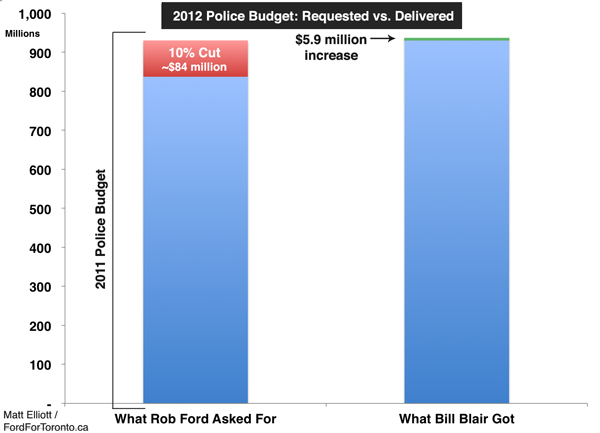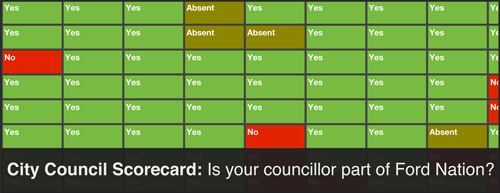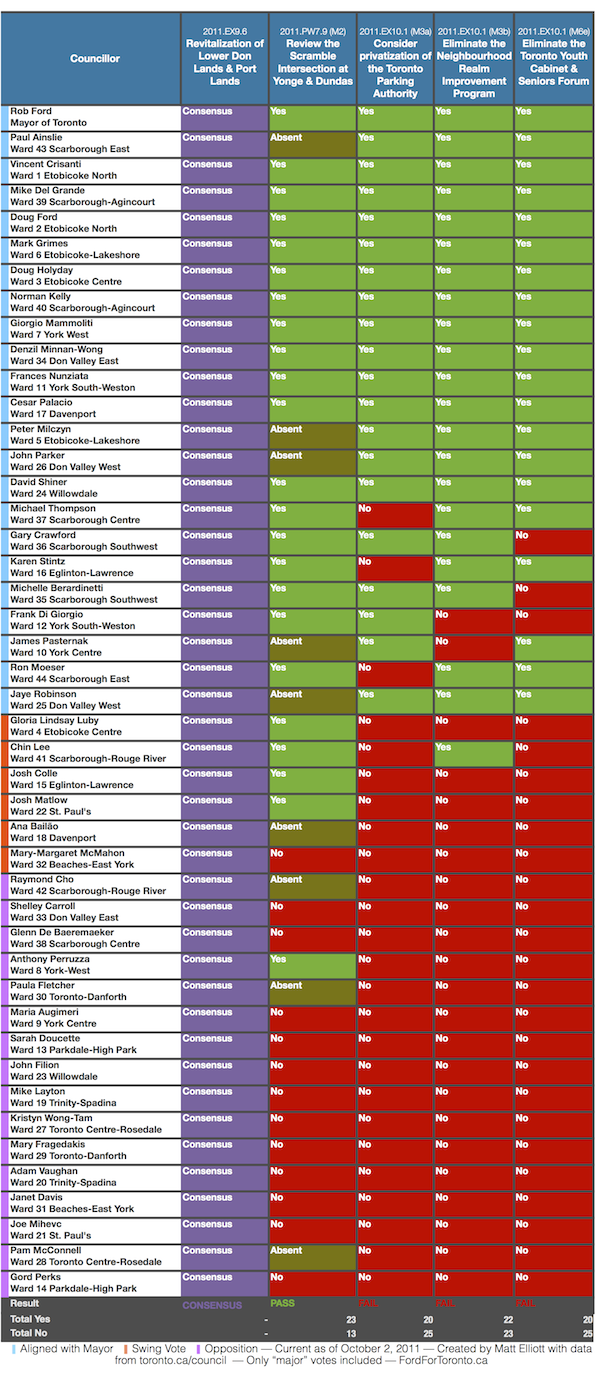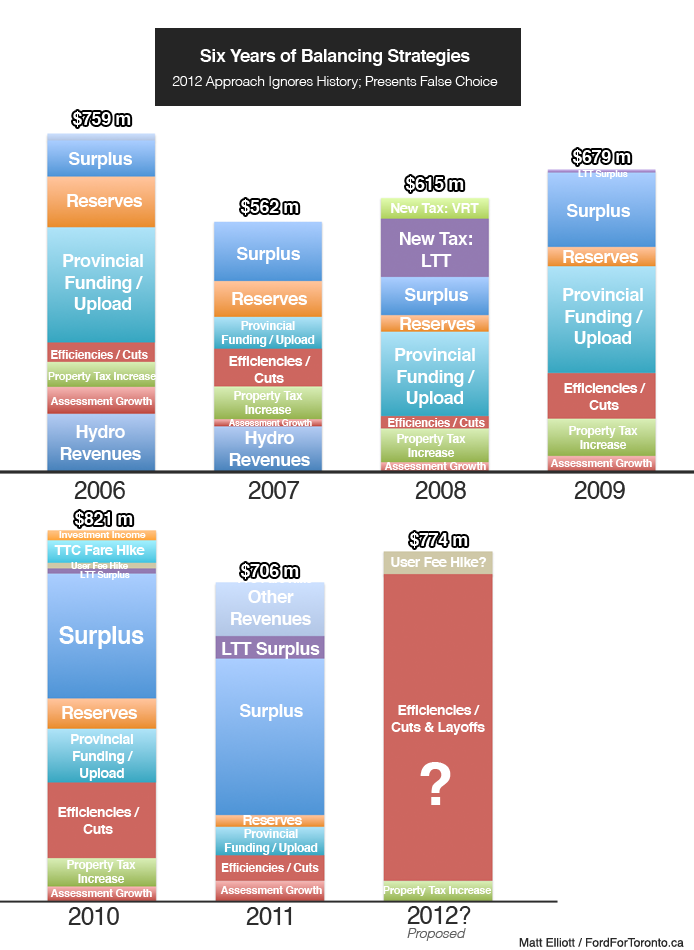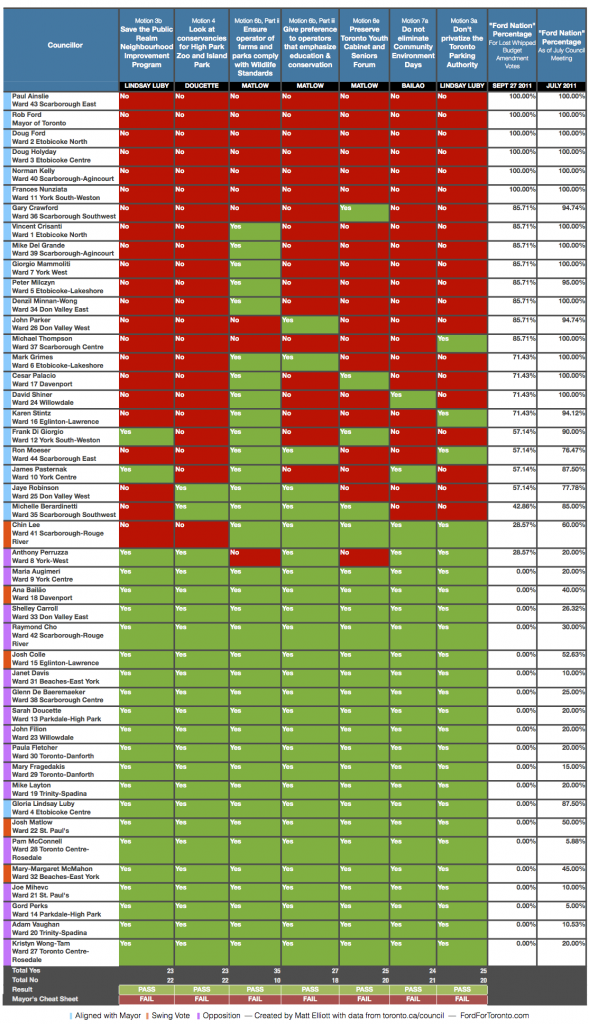After nine months of episodic thrills — Public Housing Chicanery! Disappearing Bike Lanes! Marathon Meetings! A Waterfront Under Attack! — the loud political drama that has surrounded Mayor Rob Ford since he took office last year seemed to finally quiet down last week. The only thing to really come out of City Hall was a committee decision to ban the sale of Shark Fin. Which, sure, is a good thing, from what I can tell, but it’s hardly an issue rich with intrigue or nuance. It’s simply good news for sharks.
So I decided to take last week off from blogging.
But just because shark fins were the only major thing up for debate at City Hall doesn’t mean there weren’t rumblings of larger stories to come. Here are a few jumbled thoughts on the bigger stories from the past seven days.
Provincial Election Fallout
Ford did a mini media-tour on the morning after the provincial election, going so far as to stop by the CBC studios to speak to Metro Morning’s Matt Galloway. The results of the provincial election — a complete Tory shutout in Toronto — can realistically only be seen as a major defeat for the Fords and their agenda, but the mayor still came out with his own spin on things.
The National Post’s Natalie Alcoba:
Mr. Ford met with the three major party leaders during the campaign but did not endorse anyone. During the radio interview, the Mayor dismissed any suggestion the Progressive Conservatives’ inability to crack through the 416 may have been a repudiation of his approach to balancing the books.
“Not at all. Last time I checked, we never had a seat, Tories never had a seat, my name was never on the ballot… I’m getting a lot of support, people are saying stay the course,†said Mr. Ford. “I’ve worked well with Mr. McGuinty. He helped us make the TTC an essential service and we’re not going to have strikes anymore…we have a great working relationship.â€
via Liberal minority government ‘excellent’ for Toronto: Rob Ford | National Post.
The spin is, of course, kind of lame, but there’s actually a bit of truth to what Ford’s saying: his October 2010 victory did hinge on the support he got from voters who wouldn’t describe themselves as conservative or even right-leaning.
He got that support because his major platform plank wasn’t conservative or right-leaning.
Here’s the thing about all that stop-the-gravy-train, spending-problem-not-a-revenue-problem stuff: it all rested on the premise that there wouldn’t be service cuts. Ford wasn’t preaching good, right-wing austerity and the elimination of social programs. He was calling for the status quo, only cheaper. People believed in that. They voted for that. But, in return, they got the same conservative, let’s-cut-everything governance they had roundly rejected in the past.
And that’s why the mayor is unpopular.
Improving customer service while cutting actual service
TTC Chair Karen Stintz announced a “customer service liaison panel” and an upcoming Town Hall meeting as the first step toward improving customer service on the TTC. This is incredibly boring news.
Steve Munro points out that trying to improve customer service while cuts are moving forward that would increase overcrowding on transit vehicles — thus providing worse service in general — seems kind of ridiculous:
What nobody mentioned is that most of these recommendations address problems of communication in a broad sense, but the report is silent about system management and service quality.
There has been no discussion of the service implications of the budget cuts beyond the general policy change in loading standards — we don’t yet know which routes and time periods will be affected, or how much more crowded they will be. Chair Stintz stated that the proposed cuts, in detail, would be part of the budget process at the TTC and Council.
via More Icing, Less Cake (Updated) | Steve Munro.
I don’t think you need to have a big discussion to determine that riders don’t like it when their bus driver is rude, and that they especially don’t like when their bus driver is rude and their bus is late. Customer service suffers on the TTC when service itself suffers.
Major cuts to Library Service
While Ford took branch closures off the table — finally –, library cuts are still very much on the table for the 2012 budget. And they’re significant.
The Toronto Star’s Raveena Aulakh:
Closing libraries was suggested by consultant KPMG some months ago. Ford backed down after an unprecedented public outcry led by Canadian author Margaret Atwood. But the mayor left the door open to a reduction in operating hours and other cuts.
Now the cuts are here:
•An almost 30 per cent reduction in the number of hours that neighbourhood branches will be open on Sundays.
•At least 25 neighbourhood branches losing some morning service from Monday to Saturday.
•Nearly 20,000 fewer open hours from Monday to Saturday.
•Two research and reference libraries will lose two mornings each.
•A reduced acquisition budget, meaning more than 106,000 library items won’t now be bought.
via Toronto library services face cutbacks | Toronto Star.
In an edition of the National Post Political Panel from earlier this year, Post columnist Chris Selley noted that “Ford told the Post in a sit-down interview that closing a library on a Sunday, never mind entirely, constituted a major service cut in his mind.”
So: this would be a major service cut. Do you think Rob Ford will oppose these staff recommendations, which were made to meet his edict that departments reduce their budgets by 10%?
$774 million is wrong. So wrong. Incredibly wrong.
That $774 million figure — the purported budget shortfall for 2012 that leads us to apocalyptic budget scenarios and 35 per cent tax hikes — was always BS. This is continuously confirmed by reports coming from city staff, who can’t help but point out that there are significant revenues that have come in or will come in from the 2010 and 2011 budget years.
Here’s the latest, via The Star’s Paul Moloney:
In a report to the budget committee, finance staff project the tax windfall and cost cuts mean there will be a $139.3 million surplus left over at the end of this year. That’s money that will make it easier to balance the 2012 budget.
The large surplus results in part from a hiring freeze and other cost-saving measures, but most comes from the higher tax haul.
via City headed for $140M surplus thanks to tax Ford wants to scrap | Toronto Star.
“City headed for $140M surplus thanks to tax Ford wants to scrap” is a great headline.
Ford’s allies were quick to dismiss this news, arguing that we shouldn’t use one-time funds to plug systemic budget issues. Deputy Mayor Doug Holyday told a group of his constituents that “We’ve got to make balancing the budget repeatable and accountable every single year without a provincial bailout or pulling a rabbit out of a magic hat.” The budget chief echoed that: “You should use one-time surplus money for one-time expenses. The problem for the city for a long time has been the use of one-time monies to balance the budget. We can’t get back into that trap.”
And, yes, I suppose, in a perfect world we’d have budgets that balanced without prior-year surplus dollars, which would allow us to put the surplus dollars in reserves and save them for a rainy day. But we don’t live in that world. And the only alternative we’ve been shown so far to using these one-time funds to get us through 2012 is to cut hundreds of millions of dollars from programs that people seem to value a lot.
 After months of squabbling, divisiveness and nail-bitingly close votes, Council found some consensus yesterday with a couple of items relating to sharks and elephants. The overwhelming margins on both votes prove that, while councillors stand divided on things like whether residents should have libraries to visit or late night buses to ride, they’re pretty damn united when it comes to animal protection.
After months of squabbling, divisiveness and nail-bitingly close votes, Council found some consensus yesterday with a couple of items relating to sharks and elephants. The overwhelming margins on both votes prove that, while councillors stand divided on things like whether residents should have libraries to visit or late night buses to ride, they’re pretty damn united when it comes to animal protection.